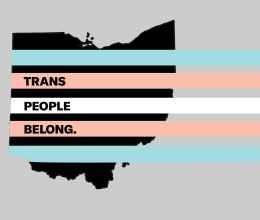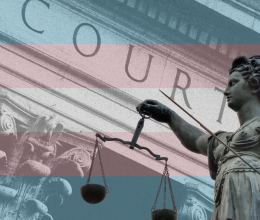Columbus – A U.S. District Court judge today ruled that the lawsuit filed by the ACLU of Ohio, the ACLU, and Lambda Legal on behalf of four transgender plaintiffs seeking accurate birth certificates can proceed. The court denied the state’s motion to have the lawsuit dismissed, thereby ensuring the four transgender plaintiffs in the case will have their day in court and the state of Ohio will be required to defend its discriminatory policy, which forces transgender people to live with incorrect, mismatched documentation that exposes them to harassment and abuse.
"We are thrilled today! Despite the state’s attempt to block our case, the court has unequivocally upheld our claims. Noting that Ohio is an extreme outlier - one of only two states that does not permit trans individuals to correct their birth certificates – the Court found that Ohio’s continued refusal violates our clients’ right to live lives without fear of exposure to discrimination, harassment or violence. This ruling paves the way to complete victory. Now we will continue to fight until we completely remove this barrier. In the end, transgender people will have access to the basic documents they need to live as their true and authentic selves," said Freda Levenson, Legal Director for the ACLU of Ohio.
“Today we took a huge leap forward toward the goal of ensuring that transgender people born in Ohio will have access to an accurate birth certificate that matches their identity, which is essential to their safety, privacy, and well-being. What we are arguing is simple: the identities and dignity of transgender Ohioans must be recognized by the state.” said Lambda Legal Staff Attorney Kara Ingelhart. “Ohio is out-of-step with the rest of the United States in clinging to this archaic and dangerous refusal to provide transgender Ohioans with accurate documentation which serves no other reason than discrimination.”
“I am looking forward to my day in court,” plaintiff Stacie Ray said. It is frustrating that it will take a lawsuit to have my state recognize me for who I really am. But I’m confident that, in the end, our fundamental right to live as our true and authentic selves will prevail and that no one else in Ohio will have to endure the horrific experiences I and my fellow plaintiffs have endured moving forward.”
The lawsuit was filed in March 2018 challenging Ohio’s refusal to correct the gender marker on birth certificates for transgender individuals, for any reason, at any time. Back then, Ohio was one of just three states, along with Tennessee and Kansas, that did not allow these corrections to be made. However, just this past June 2019, Kansas reached a consent agreement with Lambda Legal and the court ordered the state to start issuing corrected birth certificates, leaving just Ohio and Tennessee continuing with this harmful anti-transgender policy on the books. Lambda Legal is challenging Tennessee’s policy in court as well. As the court said in its opinion today, "Forty-eight other states have figured it out."
“There is no excuse for a state government to put trans people’s lives on the line in this way. The current policy outs and misgenders transgender people born in Ohio any time they have to use their birth certificate. I’m pleased that today the court acknowledged the seriousness of that type of harm. Whether, when, and how to share this sort of private information with others should be our own choice, not the government’s," said Gabriel Arkles, Senior Staff Attorney for the ACLU's LGBT and HIV Project.
The lawsuit was filed in the United States District Court for the Southern District of Ohio on behalf of four plaintiffs Stacie Ray, Basil Argento, Ashley Breda and Jane Doe, identified anonymously. The lawsuit argued that denying transgender Ohioans the ability to obtain accurate birth certificates discriminates against them and violates their privacy, liberty, and freedom from compelled speech under the U.S. Constitution.
According to the 2015 U.S. Transgender Survey, almost one-third of transgender individuals who showed an identity document with a name or gender marker that conflicted with their perceived gender were harassed, denied benefits or services, discriminated against, or assaulted. Transgender individuals also are disproportionately targeted for hate crimes.
The lawsuit is Ray v. Himes. Read more about the case.
Read the full order.
###







